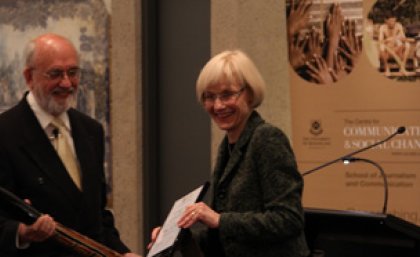
The University of Queensland (UQ) has recognised the commitment of a prominent international professor in applying the principles of communication for social change.
Human rights professor Cees Hamelink was awarded The University of Queensland 2012 Emeritus Award for Communication for Social Change on July 5 in Brisbane.
UQ’s School of Journalism’s Centre for Communication for Social Change presents the award annually.
The award celebrates individuals who have demonstrated extraordinary commitment to using communication to transform and empower marginalised communities.
Professor Hamelink is the author of 18 books on communication, culture and human rights.
He tours the world fostering communication research and advises a number of United Nation’s organisations on global media and communication issues.
Professor Hamelink’s current work aims to improve social communication between humans, who are by nature individualistic.
“Social communication is all about dialogical engagement and that means really listening to other people,” said Professor Hamelink.
“Humans could learn a lot from the amicable ape species, the Bonobo.
“What we really need in our societies is Bonobo communication, which would be disarming, dialogical, far more open and pleasant.”
While presenting the award on the night, Vice-Chancellor Professor Debbie Terry said there was a critical need for scholars like the eminent Professor Hamelink.
“We live in a time of unprecedented global complexity. There is a critical need for scholars, like the eminent Professor Hamelink, to interrogate, understand and advocate for the role of media, information and communication processes in a robust and participatory democracy”.
Professor Terry applauded the Centre for Communication and Social Change for its work in addressing critical global issues.
“Despite its youth, the CfCSC has established a reputation for quality research and has received international recognition for its research on social change in south-east Asia; particularly Vietnam and Indonesia,” Professor Terry said.
“One of the Centre’s great strengths is engaging outside of traditional academia, working with government bodies such as Australian Council for International Agricultural Research (ACIAR) to improve food security, lift poverty by supporting developing countries shift from traditional subsistence levels to a more sustainable and market-oriented agricultural economy.”
.jpg)


